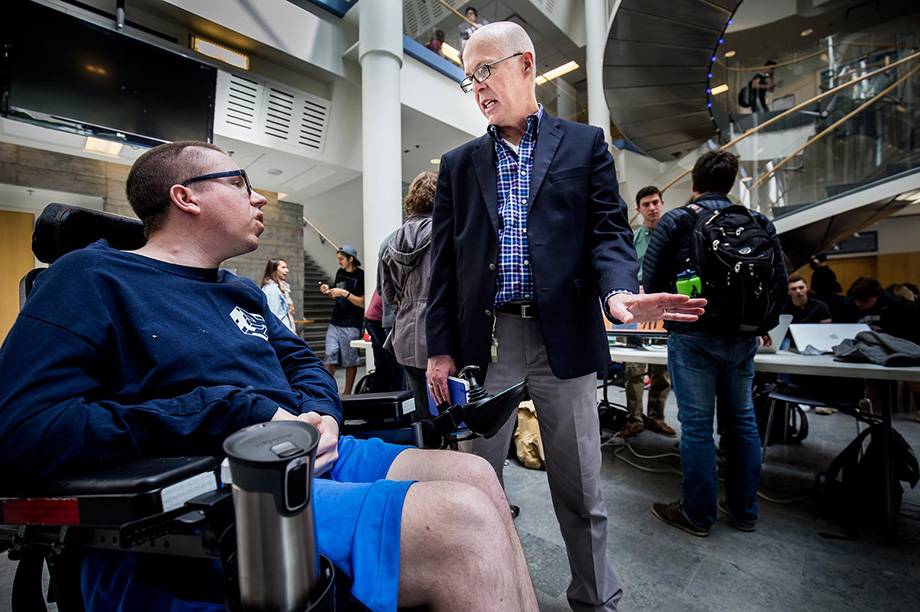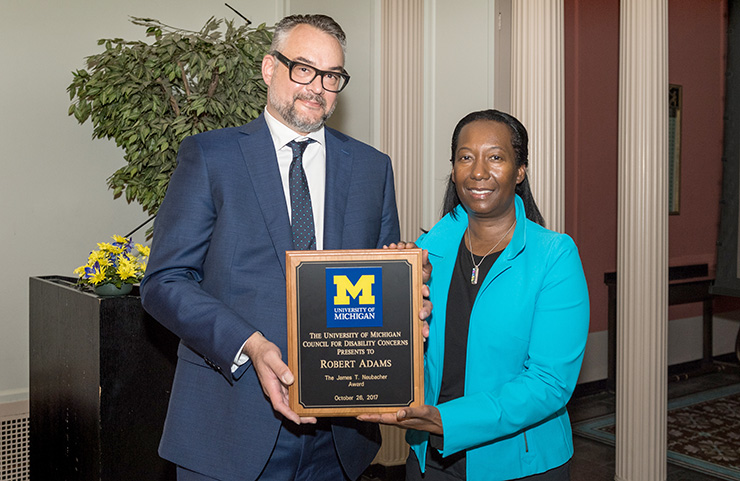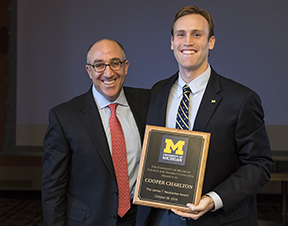The James T. Neubacher Award is presented to a faculty member, staff member, student, or alum of the University for significant achievements in:
- Empowering people with disabilities.
- Advocating for or advancing disability rights or disability justice
- Increasing the accessibility of programs and services to promote disability inclusion.
- Nominations for the 2025 Neubacher Award can be made now!
Nominations are Always Welcome
Want to make a nomination for the 2025 Neubacher Award? We would love to hear from you! Please let us know how your nominee contributes to increasing accessibility, advocating for or advancing rights, attempting to eradicate systemic ableism, or other impactful efforts.
To learn more about the review process, see a Sample Neubacher Award Review Form. Each nomination is reviewed by at least two members of the selection committee. If your nominee has been recognized in the past, please make sure to highlight current contributions.
Congratulations 2024 James T. Neubacher Award Recipient - Ayesha Ghazi Edwin
Read more about the award in the University Record.
Ayesha Ghazi Edwin (she/hers) has been an Assistant Clinical Professor at the University of Michigan’s School of Social Work since 2019. An MSW graduate of U of M, Ayesha’s career focuses on social justice and policy change across key areas like voting rights, housing, healthcare, and labor. Emphasizing that “every issue is a disability issue,” Ayesha draws from her experiences as a South Asian immigrant woman with a disability to guide her work and integrates disability justice principles in the university that she gained while serving as the former Deputy Director of Detroit Disability Power (DDP).
In her teaching, Ayesha prioritizes empathy, empowerment, and universal design. “I want students to recognize that disability is a natural, beautiful part of human diversity,” Ayesha says, “and that struggles often arise due to inadequate systems and policies rather than individual limitations.’’ Her commitment to inclusive education led her to create the School of Social Work’s first disability justice-focused certificate program, “Disability Inclusion and Accessible Design,” or DIAD. She was also honored with the 2021 Provost’s Teaching Innovation Prize for developing an accessible, fully virtual course that connected students to local policy efforts during the pandemic.
As an Ann Arbor City Council Member, Ayesha has championed accessibility and equity initiatives, including Michigan’s first “Right to Sit” ordinance, which has inspired the introduction of state legislation, securing the city’s first universally designed playground and splash pad, increasing the city’s accessible parking spaces, limiting facial recognition technology, and enacting protections against discrimination based on IDs. She also led efforts to establish the city’s first dedicated disability and accessibility role in the city and made Ann Arbor the first city in Michigan to advocate for ending subminimum wage practices.
At the University, Ayesha is currently leading a “Year in Democracy” initiative in collaboration with Detroit Disability Power and The Carter Center to recruit volunteers to audit polling accessibility in Washtenaw County, ensuring voters with disabilities are able to vote. Data collected will inform DDP’s recommendations to election officials and policymakers statewide. Ayesha’s dedication to disability inclusion shapes her impactful work in academic and civic spaces and inspires our students to embrace their unique value and potential, regardless of their identities or abilities.
Honorable Mentions
Madeline Shay
Madeline Shay is a PhD Student in the Cellular & Molecular Biology program here at UM-Ann Arbor. While here, Madeline has developed the Disabled Scientists’ Resource Hub, with around 100 resources herself and other disabled researchers have found useful. She’s also led large sessions on Empowering Disabled Scientists at large international conferences, been a formal and informal peer mentor to other disabled students here and at universities across the country, and advocated for more inclusive policies within her PhD program.
Erik Robeznieks, MBA
Associate Director, Adaptive Sports & Fitness, U-M Student Accessibility & Accommodation Services
Erik Robeznieks has worked in adaptive sports for nearly a decade, formerly with Wheelchair Basketball Canada managing the operations for the National programs. Erik has worked with Adaptive Sports & Fitness at the University of Michigan for the past four and a half years supporting the mission, vision, and growth of adaptive sport and fitness initiatives within the University of Michigan and the broader adaptive sport landscape at the local, state, and national level.
Melissa A. Sreckovic, PhD
Director, Honors Program, Associate Professor of Education
Dr. Melissa Sreckovic is an Associate Professor of Special Education and Director of the Honors Program at the University of Michigan-Flint. Her research focuses on developing and evaluating effective strategies to create inclusive environments for individuals with disabilities in schools and communities, with a particular emphasis on supporting those with autism spectrum disorder. Dr. Sreckovic was the driving force behind the creation of Officer Friendly Day, an annual event that fosters positive relationships between autistic individuals, their families, and local law enforcement, with the goal of enhancing the safety of autistic individuals in their communities. She also co-hosts Inclusive Halloween, which draws over 350 volunteers and 1,000 attendees, creating an accessible, judgment-free space for the community to celebrate together.
Hilary Murmers
LGBTQIA+ Coordinator, Center for Gender and Sexuality, University of Michigan-Flint
Hilary Murmers (she/her) is the LGBTQIA+ Coordinator in the Center for Gender and Sexuality at UM-Flint. She achieved her Masters in Education in Human Sexuality from Widener University in 2021, and she started her role at CGS in September 2021. Hilary is passionate about building community among Queer and Trans community members. Hilary is a cancer survivor and lives with multiple disabilities. She prioritizes disability justice in her work.
Maire Sile O'Modhrain
Professor of Music, School of Music, Theatre & Dance
Sile O'Modhrain's research focuses on human-computer interaction, especially interfaces incorporating haptic and auditory feedback. Alongside her many Ph.D. students, she has spent the past 25 years exploring new ways to make information accessible to Blind and Visually Impaired (BVI) people. In 2019, she co-founded NewHaptics, an Ann Arbor-based start-up that is developing a novel multi-line tactile display using microfluidic actuators. Most recently she has been working with the Smith-Kettlewell Eye Research Institute in San Francisco to establish a series of summer programs taught for blind people by blind professors on accessing and visualizing data using non-visual methods.
Pamela Saca and Caroline Damren
Pamela Saca is a Continuous Improvement Specialist at the Center for Academic Innovation (CAI) at the University of Michigan. Pam focuses on inclusive design processes in the development of online learning experiences such as Massive Open Online Courses (MOOCs) and online degree courses. Additionally, Pam works with teammates to identify and iterate on many of CAI's course offerings to improve overall learner accessibility. Prior to this year, Pam spent three years as a Learning Experience Designer for Accessibility at CAI where she was able to hone her accessible and inclusive design knowledge, connect with other accessibility-focused employees across campus, and work directly with faculty to create more accessible online courses for a worldwide audience. Pam holds an M.A. in Educational Studies focusing on the design of learning technologies from the University of Michigan and an M.A. in Curriculum and Instruction from Eastern Michigan University. Additionally, she is a former elementary public school teacher of thirteen years and a previous elementary Section 504 building case manager. She draws on her extensive experience in the education field to inform her current work, which includes advocating for an emphasis on greater digital accessibility knowledge and practices across campus.
Caroline Damren is the Copyright and Accessibility Specialist at the University of Michigan’s Center for Academic Innovation (CAI). In her role, she supports faculty and staff in navigating compliance within online learning experiences, focusing on copyright, accessibility, and third-party risk. Prior to her work at CAI, she worked as a Speech-Language Pathologist (SLP) and, more recently, as a Student Support Coordinator. As an SLP, she developed a passion for disability advocacy. In her role as a Student Support Coordinator, she led special education teams and managed the processes for Special Education and Section 504 eligibility. She became well-versed in special education policy and worked closely with parents, administrators, teachers, and related services staff to collaboratively support students. Caroline holds a Bachelor’s degree in Communication Sciences and Disorders from the University of Cincinnati and a Master’s degree in Speech-Language Pathology from George Washington University.
Sabrina Moritz
Testing Accommodations Facilitator, Testing Accommodations Center, U-M Student Accessibility & Accommodation Services
Sabrina Moritz spent a year and a half working for Disability and Accessibility Support Services (DASS) at UM-Flint as the Student Program Assistant. There, she facilitated multiple creative initiatives to increase disability awareness, improve the cultural climate on campus, and improve DASS’s overall program. Sabrina has recently started working as a Testing Accommodations Facilitator for the Testing Accommodations Center and plans to continue her initiatives at UM-Ann Arbor.


